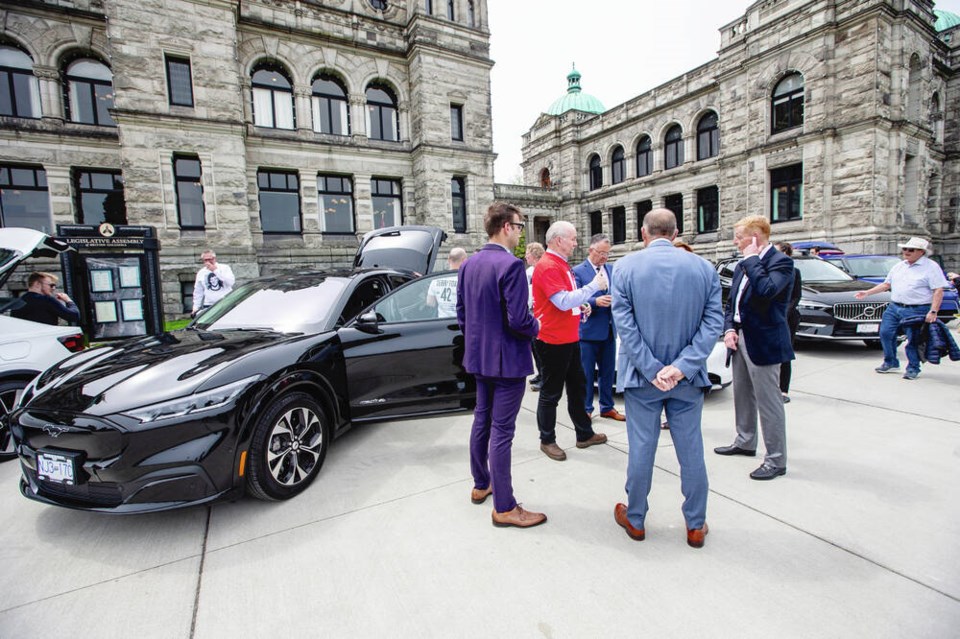The province rolled new electric vehicles to the front steps of the legislature on Wednesday, boasting that British Columbia now leads all North America jurisdictions in zero-emission vehicle sales.
George Heyman, minister of environment and climate change strategy, said 13% of all new light vehicle sales in B.C. in 2021 were zero-emission vehicles — the highest rate on the continent on a per capita basis — and first-quarter results this year show it’s increased to 17%.
“We’re doubling in two short years on the rate of [EV] take-up.” said Heyman.
Despite supply chain issues that have delayed deliveries of new EVs, Heyman said: “We want to accelerate that up-take.”
Heyman said the rapid adoption of electric vehicles is being noticed in the U.S., where last week in meetings with counterparts in Washington, Oregon and California, all made a point of highlighting B.C.’s lead — “even California,” said Heyman.
Blair Qualey, chief executive of the New Car Dealers Association of B.C., which also administers the province’s Clean B.C. vehicle rebate program, said despite the pandemic and supply chain issues, just over 18,000 rebate transactions were processed in 2021 — the highest in 10 years.
Late last year, the Victoria EV Association said manufacturers were struggling to keep up with demand and it is taking three months to a year to get a new EV, although used EVs are available.
The Clean B.C. rebate program offers rebates of up to $8,000 on 52 makes and models of electric vehicles.
Qualey said those incentives have been the major reason for increases in sales, but also noted the commitment of provincial and local governments to provide more access to public charging stations and to bring awareness about the benefits of zero-emission vehicle ownership.
“The course we have charted creates a path for continued success,” said Qualey. “It’s good for government, good for business and good for the environment.”
The province said it had created about 3,000 charging stations by the end of 2021 and plans to have more than 10,000 by 2030.
Bruce Ralston, minister of energy, mines and low carbon innovation, said the province will also continue to invest in EV maintenance training programs. The British Columbia Institute of Technology launched the first training program in 2019 to provide Red Seal automotive technicians with the skills they need to work on EVs. In 2021, the program was expanded to Okanagan College, College of New Caledonia and Camosun College.
“We have had 24 technicians complete the electric vehicle technology and service course at Camosun College, with another 24 scheduled to complete by the end of the year,” said Patrick Jones, instructor and program leader at Camosun.
Julian Sale, who owns Motorize Electric Vehicles and operates sales lots of new and used electric vehicles in Sidney and View Royal, said the popularity of EVs is escalating. He sells between 20 and 30 vehicles a month, saying operating costs are often the magnet that draws new buyers, especially with gas prices at a record high.
“Two cents a kilometre is better than 50 cents a kilometre,” he said.
Sale said first-time buyers are on average a more mature demographic because the cost of EVs is rising — “easily about 10 grand higher than last year,” said Sale, noting that inflation and inventory challenges are major reasons.
“The 20- and 30-somethings can’t afford a $50,000 car,” he said.
Sale said governments should invest in training, the mining of materials that make EV systems and bring manufacturing of the parts to Canada — and leave charging stations to the private sector. He said service stations such as Petro Canada are already developing a coast-to-coast charging strategy and others will follow the demand.
The EV sector is reliant on components from all over the world, which is delaying the manufacturing and delivery of EVs, he said.
The New Car Dealer Association of B.C. presented Green Star Dealer Awards to recognize new car dealers in the Vancouver Island region who have recorded the highest number of zero-emission vehicle sales, across all brands — though no numbers were provided.
The CleanBC Go Electric Green Star Dealer Award winners were Victoria Hyundai, which won the top battery electric vehicle sales award, and Jim Pattison Toyota Victoria, winner of the top plug-in hybrid electric vehicle sales award.




